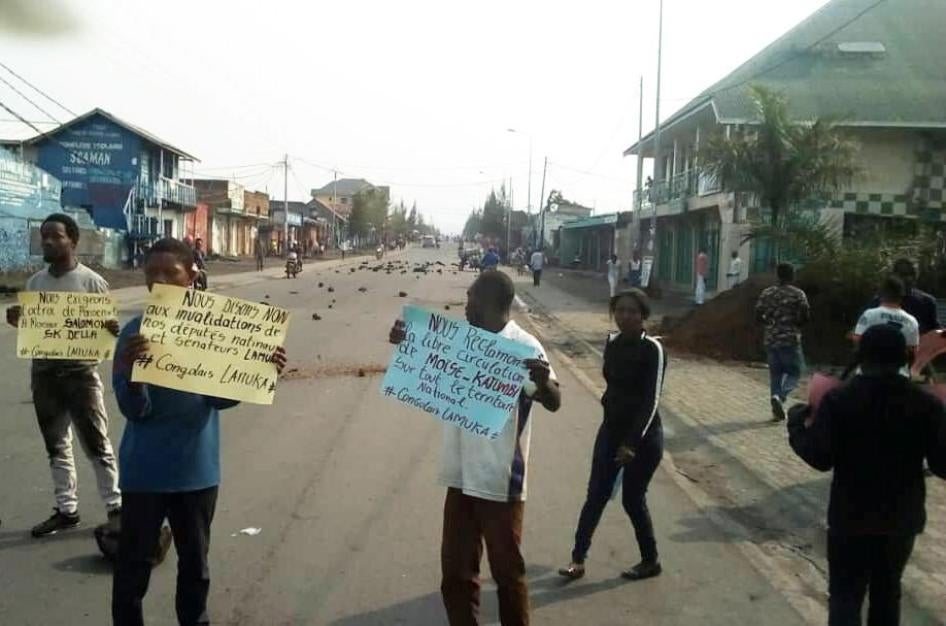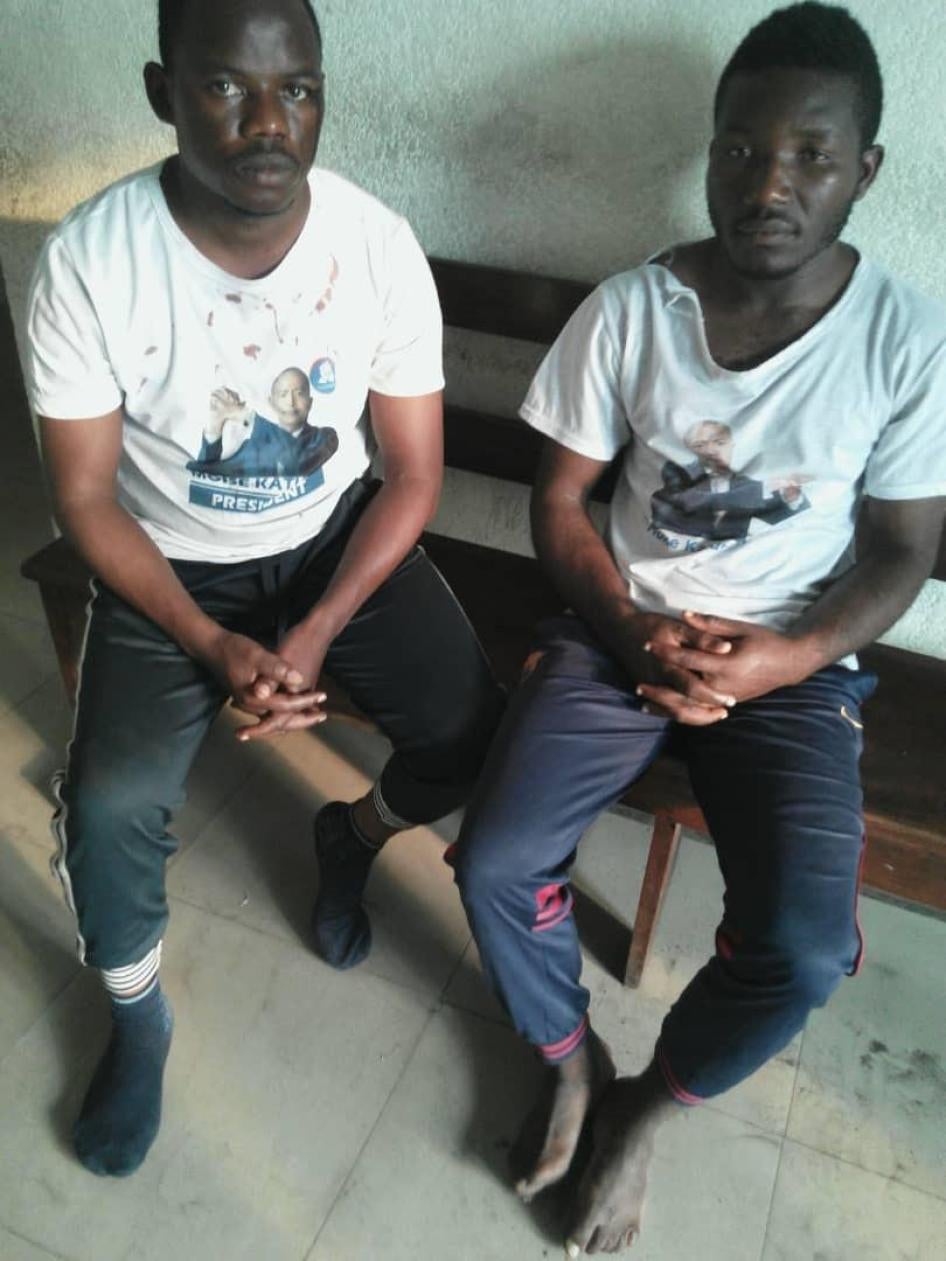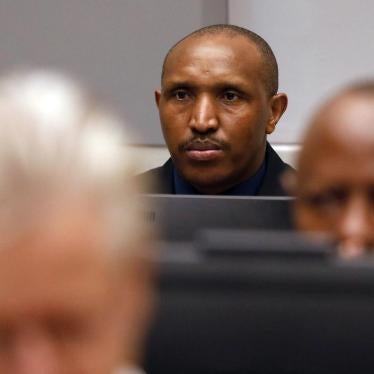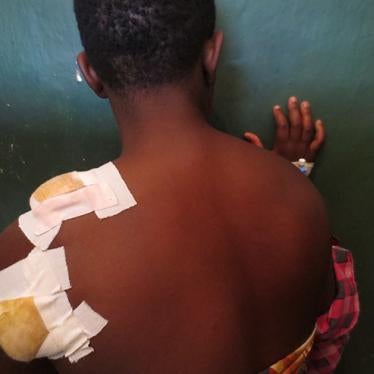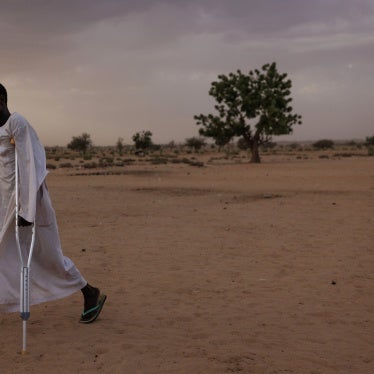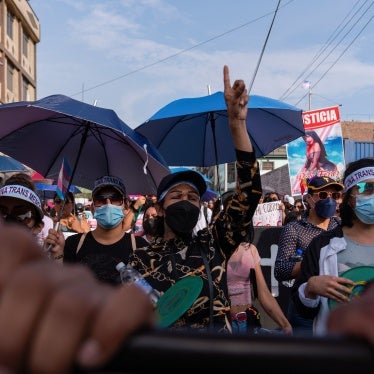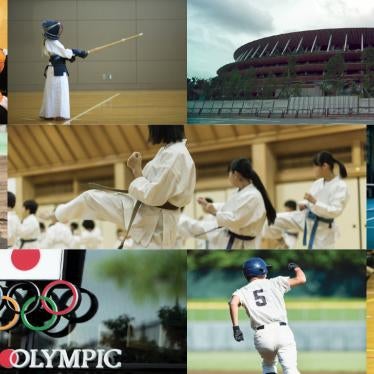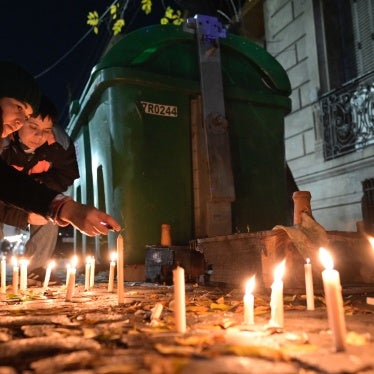(Kinshasa) – Police in the Democratic Republic of Congo fired live ammunition, killing one person, in dispersing opposition protests on June 30, 2019. They also used teargas, beatings, and arbitrary arrests against protesters in Kinshasa, the capital, and the eastern city of Goma.
“Congolese authorities should thoroughly and impartially investigate the alleged excessive use of force by the police and hold those responsible to account,” said Lewis Mudge, Central Africa director at Human Rights Watch. “Congo’s new administration should break from its past and show that abuse by the police will no longer be tolerated.”
The Lamuka (“wake up”) coalition, which backed Martin Fayulu in the December 2018 presidential elections, called for peaceful protests on June 30 – Congo’s independence day – against widespread corruption and election fraud. The country’s Constitutional Court recently invalidated the election of some 20 opposition members to parliament.
The police in Goma dispersed demonstrators with teargas and live ammunition. In Mabanga-Nord neighborhood, police shot 26-year-old Paluku Kamala. “I saw a young man hit by a bullet,” a protester said. “He fell, and then the police came to pick him up.” Police took Kamala in their jeep to the CBCA-Virunga hospital and left him there, though the hospital cannot treat injured people. An ambulance transferred Kamala to the CBCA-Ndosho hospital, which is better equipped to treat injuries.
“The bullet had reached his pelvis and hit his stomach,” a source at the hospital told Human Rights Watch. Kamala died on July 1, his death certificate said.
After Kamala was shot, people burned a bus and vandalized shops. The police said that protesters were hostile and erected barricades, and that a police officer was wounded. Col. Pierrot Mwanamputu, the national police spokesman, promised an investigation to “find out who fired the shot and on whose orders.” He said that the “police officer who fired the shot must be arrested because it is formally prohibited for a police officer to use a lethal weapon during the demonstrations.”
Police arrested at least four Lamuka supporters in Goma on June 30. One opposition supporter, 29, said that he was talking about the upcoming march with colleagues when five people in civilian clothes asked what they were doing. The activist explained that they were with the opposition and wanted to march peacefully: “Immediately, a man among the five in civilian clothes slapped me in the ear. I fainted. I didn’t really know what happened, but then my friend [name withheld] and I were arrested.”
“At the [Munzenze] police station, they beat us up and tore our clothes. When we entered [the cell], the police ordered the detainees who were there to beat us up too.” At least two men among those arrested were beaten. Human Rights Watch spoke with them and saw their wounds.
Later that day, five Lamuka supporters were arrested and held overnight with the others. Another opposition activist was arrested on July 1 after asking about the detention of protesters. They were all released later that day, after paying fines.
In Kinshasa, small groups tried to march in some parts of the city, but the police quickly dispersed them, in some cases firing teargas and beating protesters. Apparently to stop the march, police punctured the tires of two Lamuka leaders, Fayulu and Adolphe Muzito.
A video that circulated on social media showed the beating of Thythy Tshilambu, a journalist and administrative director from RTVS1, the radio and television station owned by Muzito. Tshilambu told Human Rights Watch: “I was wearing a shirt that showed I belonged to a media organization, but police officers dragged me out of the vehicle that I was filming from and then started beating me with their clubs and belts. They put me in a police jeep where other officers joined to beat me for several minutes. They then threw me out of the jeep, and I passed out.”
#RDC: Quelques militants de la @_Lamuka chicotés par les éléments de la Police nationale à #Kinshasa lors de la marche de l’opposition interdite par le gouverneur de la même ville. pic.twitter.com/SkAckWHM7I
— stevewembi (@wembi_steve) June 30, 2019
RTVS1’s signal has been cut since June 29 without explanation, Tshilambu said. On July 2, President Felix Tshisekedi denied responsibility: “I didn’t make that decision. When I was informed of RTVS1, I was told that this channel is known for hate speech.” He said he would follow up on this situation.
Some demonstrators in Kinshasa threw stones at the police officers. The police said that one officer was seriously injured. At least one demonstrator, Joel Ituka, a member of the “Zero Impunity” citizens’ movement, was arrested. He said that protesters threw stones after police beat him and other protesters. Police responded with teargas and took Ituka to the provincial police station. “They beat me the whole way,” he said.
At the police station, “one of them kicked me in the back, I couldn’t stand the shock; I fell and couldn’t get up.” He was accused of assaulting a police officer. On July 2, the prosecutor refused to interrogate him because of his condition, Ituka said. He was released later that day and sought hospital treatment.
The government has asserted that it lawfully banned the demonstrations. In a letter addressed to Lamuka representatives, dated June 27, the governor of Kinshasa, Gentiny Ngobila, said the march would be banned because it was to take place on “the sacred and commemorative date of June 30.” Kinshasa’s police commissioner, Gen. Sylvano Kasongo, then said in a statement to the media that any gathering of more than 10 people would be dispersed.
Under Congo’s constitution, organizers of political demonstrations must inform local administrative authorities in writing in advance, but they don’t need prior authorization. The International Covenant on Civil and Political Rights, to which Congo is a party, states that no restrictions may be placed on the exercise of the right of peaceful assembly “other than those imposed in conformity with the law and which are necessary in a democratic society in the interests of national security or public safety, public order, the protection of public health or morals, or the protection of the rights and freedoms of others.” Ngobila’s reason for banning the protest did not have a legal basis, Human Rights Watch said.
The United Nations Basic Principles on the Use of Force and Firearms by Law Enforcement Officials provide that security forces shall as far as possible apply nonviolent means before resorting to the use of force. Whenever the lawful use of force is unavoidable, the authorities should use restraint and act in proportion to the seriousness of the offense. Lethal force may only be used when strictly unavoidable to protect life.
In a June 29 interview with Radio France Internationale (RFI), President Tshisekedi supported the governor’s decision: “I agree with this ban…. The rights and freedoms of citizens are guaranteed, but we have the impression that there are some who confuse democracy and anarchy.” Tshisekedi said that security forces were trained to “maintain peace” and would not use violence against protesters.
Three Lamuka representatives told Human Rights Watch that a Lamuka member tried to deliver a letter to Goma’s mayor on June 28, to inform him about the planned protest, but his office refused to receive it, saying that the mayor and his secretary were absent.
Congo’s government in recent years has imposed significant restrictions on the rights to freedom of expression and peaceful assembly. Between 2015 and 2018, as then-president Joseph Kabila retained power beyond the end of his constitutionally mandated two-term limit, security forces shot dead nearly 300 people during largely peaceful protests and arrested over 2,000 political opposition leaders and supporters – including many from Tshisekedi’s party – as well as pro-democracy activists and journalists.
“After years of political repression under his predecessor, President Tshisekedi has the opportunity to create a climate conducive to the respect of public rights and freedoms,” Mudge said. “His administration should put an end to the excessive use of force by the police and ensure that all Congolese are able to express themselves without fear of reprisals.”
